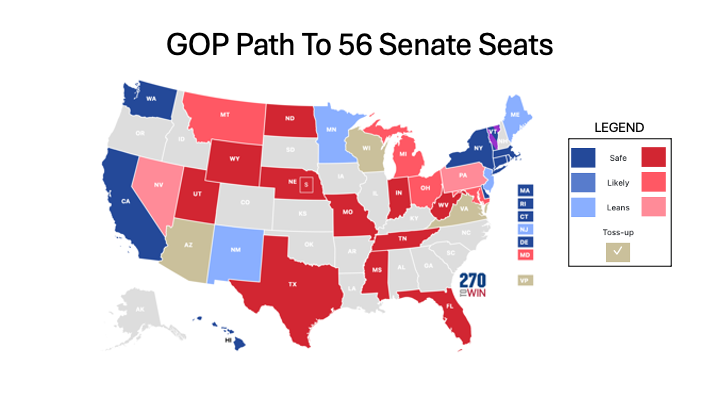The elections for the European Parliament provided the clearest evidence yet that large numbers of voters oppose mass immigration, reject extreme climate measures and resist the continuing dissolution of their civilization into a relativist, multicultural mush.
Gerald Baker (The Wall Street Journal)
As the Wall Street Journal’s Gerald Baker points out, western electorates have changed since 2016. Decent folks like the “right wing” and don’t care if liberal media call them nationalists or protectionists. Voters from Dayton to Dresden view the “political right” as guarantors of affordable energy, cultural centrism, and limited immigration – and that is why eleven Senate liberals face tough re-elections this fall.
Already, a conservative wave has forced France’s president to dissolve Parliament and call snap elections, and Biden’s polling averages are losing lots of minority, working-class, and young voters in battleground states. According to Vox’s Eric Levitz, liberal elites have spawned “low-trust voters” who are decidedly anti-incumbent, meaning Republican senate hopefuls could pick up seven seats. Low-trust voters are now 56% of the US electorate (based on the RCP averages for political approval and direction).
Levitz adds an eye-opener: low-trust voters increasingly prefer Kennedy to Biden, mostly because young Blacks skip church, young Whites listen to Joe Rogan, and middling folks listen to talk radio. Democrat “influencers” no longer hold sway over these voters, who also don’t talk to pollsters; so, they are under-counted in polls that show Biden sinking and Trump climbing. Thus, this handicap sees trouble for Senate Democrats. Note: polling averages are from Real Clear Politics.
Republicans will easily hold onto ten senate seats (FL, IN, MO, MS, NE, ND, TN, TX, UT, WY). Some election pundits have Florida and Texas as “leans Republican” now, but Trump’s already at 52% in both states, Scott (FL) is up 11 points, and Cruz (TX) leads by 9, so that’s 49 seats locked and loaded for next year. Elsewhere, the Senate GOP’s campaign chief has ensured “winners” represent his party (and Trump’s wisely going along).
The sure-fire GOP flip is West Virginia, where Democrat (now independent) Joe Manchin is retiring, Trump leads Biden by 40 points, and Gov. Jim Justice (R) has a 36-point lead in the senatorial contest today. That’s 50 senate seats and (maybe) Trump’s vice-president casting the deciding vote.
The GOP safe bets are Maryland, Montana, and Ohio, where Biden’s numbers are down from 2020 across the board. Former Republican Governor Larry Hogan (MD) is still very popular and up 4 points. Senate Democrats Jon Tester (MT) and Sherrod Brown (OH) have slight early leads, but Trump’s up 21 in Montana and 10 in Ohio (where the “abortion issue” was settled last November). This gives the GOP 53 senate seats and a check on Biden.
Populist revolts are shaping up in Michigan, Nevada, and Pennsylvania. Biden’s approval is down at least 15 points in each state, Trump is up anywhere from 1 to 6 points, and both parties agree that “Biden is underwater everywhere.” Sen. Slotkin (D-MI) has only 37% voter-support against a generic Republican. Sen. Rosen (D-NV) is in a virtual tie, and Sen. Casey (D-PA) is within polling margins for error. Odds are low-trust voters oust two of these incumbent Democrats, pushing the GOP’s senate seats to 55.
The GOP probably flips one of Arizona or Wisconsin. Biden’s favorability has tanked from 2020, when he barely won, and Trump is up anywhere from 1 to 4 points. Kari Lake (AZ) wins if Rubio is Trump’s VP choice, and she runs a competitive ballot-harvesting operation. Sen. Duckworth (D-WI) is polling 4 points below her 2018 results, and evangelical Christians are very well organized here. If 2024 is a red-wave election, expect a 1-1 split, giving the GOP 56 senate seats.
The GOP could flip Maine, Minnesota, or Virginia, where Biden’s approval has dropped below his 2020 numbers. If just one of these senate seats were to flip, it would mean Republicans ran competitive ballot-harvesting operations, and Trump had a big night. Still, the view here is that King (ME), Klobuchar (MN), and Kaine (VA) hold onto their seats, leaving Republicans happy and sitting in 56 senate seats.
There are multiple keys to Republican victory, starting with an anti-Biden mood across the nation. Since his inauguration, his approval and likability have dropped 15 points. He now trails in seven “old” battleground states, and has slipped in five “new” battleground states (source: RCP average). When an unpopular president must campaign in battleground states were his party’s senators don’t want him, it helps the other party up and down the ballot.
In 2018, these Democrat senators easily rode an anti-Trump wave to victory, but today’s polling averages all show the 2024 battleground “growing and tilting” toward Trump. Most of these Democrat incumbents have slipped in the polls, and now have to defend radical policies (open borders) and positions (boys in girls sports) against GOP challengers, who aren’t Dr. Oz or Herschel Walker.
Still, Republican victories – and control of the Senate – come down to competitive ballot-harvesting operations. It’s a no-brainer, and Trump overhauled the RNC for this reason alone: (to paraphrase) I have the votes. We just need to stop the other side from casting and counting illegal ballots. America is NOT a left-liberal nation, and the votes are sitting in evangelical churches, shopping at gun shows, and hating Biden.
